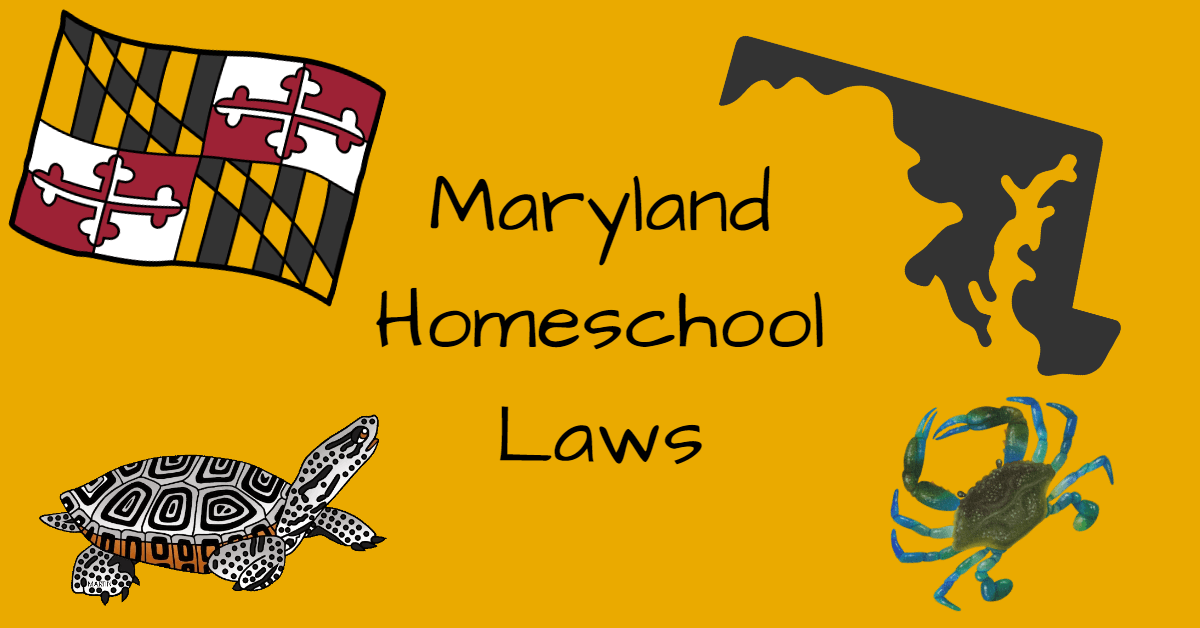Below is a summary of Maryland Homeschool Laws to help you ensure your homeschool is compliant.
Looking For Another State? (Click to Drop Down)
Alabama – Alaska – Arizona – Arkansas – California – Colorado – Connecticut – Delaware – Florida – Georgia – Hawaii – Idaho – Illinois – Indiana – Iowa – Kansas – Kentucky – Louisiana – Maine – Maryland – Massachusetts – Michigan – Minnesota – Mississippi – Missouri – Montana – Nebraska – Nevada – New Hampshire – New Jersey – New Mexico – New York – North Carolina – North Dakota – Ohio – Oklahoma – Oregon – Pennsylvania – Rhode Island – South Carolina – South Dakota – Tennessee – Texas – Utah – Vermont – Virginia – Washington – West Virginia – Wisconsin – Wyoming
Note: The information below is not to be considered legal advice. I’m a homeschool mom with an interest in helping you, not a lawyer. I strongly recommend that you contact your state education department if you have questions specific to your circumstances.
Homeschool
Maryland has requirements to notify your local school district, core subjects, and portfolio reviews.
Can I Teach?
There is no requirement for you to meet in order to teach.
You may have other parents or a private instructor teach in a co-op format, however this should be supplementary.
Do I Have to Notify the State?
Yes. You must notify your local superintendent of your intent to homeschool at least 15 days before beginning instruction. Your local school district may have a form for this.
You must submit a renewal notice each year. This may differ by school district too, so contact them for additional information.
Required Subjects
You must teach Maryland’s core subjects, which include:
- English
- Mathematics
- Science
- Social Studies
- Art
- Music
- Health
- Physical Education
Portfolio Review
Maryland requires a review of your child’s portfolio of work twice a year, at the end of each semester. This can be done by your local school or supervised by one of the following:
- A nonpublic school that holds a Certificate of Approval from the Maryland State Department of Education
- A church-exempt nonpublic school
- An institution (education ministry) offering an educational program operated by a bona fide church organization
You can find a list of schools registered to supervise your homeschool here.
How Many Days a Year do I Have to Teach?
Maryland Homeschool Law states instruction should take place on a regular basis during the school year and be of sufficient duration to implement the instruction program.
I’d recommend roughly following the Maryland public school year, which is 180 days or 1,080 hours of instruction.
Of course, as a homeschool you have more flexibility and can probably get a lot more done in less time, so you don’t need to be incredibly rigorous about this.
I strongly recommend keeping attendance just in case your local school or supervising organization asks.
Compulsory Attendance Age
The compulsory attendance age is the age range in which your child must be attending school of some type.
In Maryland, your child must be enrolled if they turn 5 years old by September 1st of the school year until their 18th birthday, or when they graduate high school.
Public School Sports
The Maryland Public Secondary Schools Athletic Association (MPSSAA) allows homeschoolers to participate in extracurricular activities on a nonpublic school or church school’s team.
These schools may be able to compete against public schools in Maryland.
Contact local private schools in your area to see if they may allow your child to participate.
Wrapping Up
Hopefully this summary of Maryland Homeschool Laws gets you started on your homeschool journey with your family!
If you’re just getting started, you’re probably feeling a bit overwhelmed.
The Home Learning Kit can help!
It’s a package of handy learning tools to make your homeschool more fun and engaging, curated by yours truly. Check it out!


